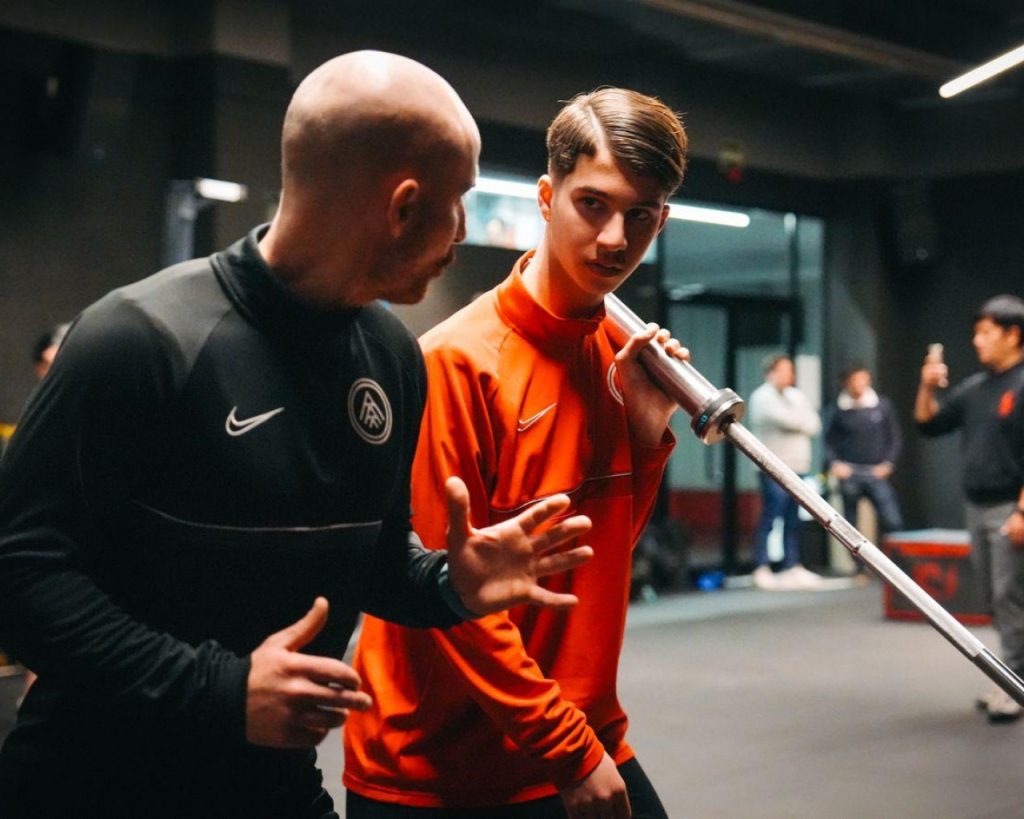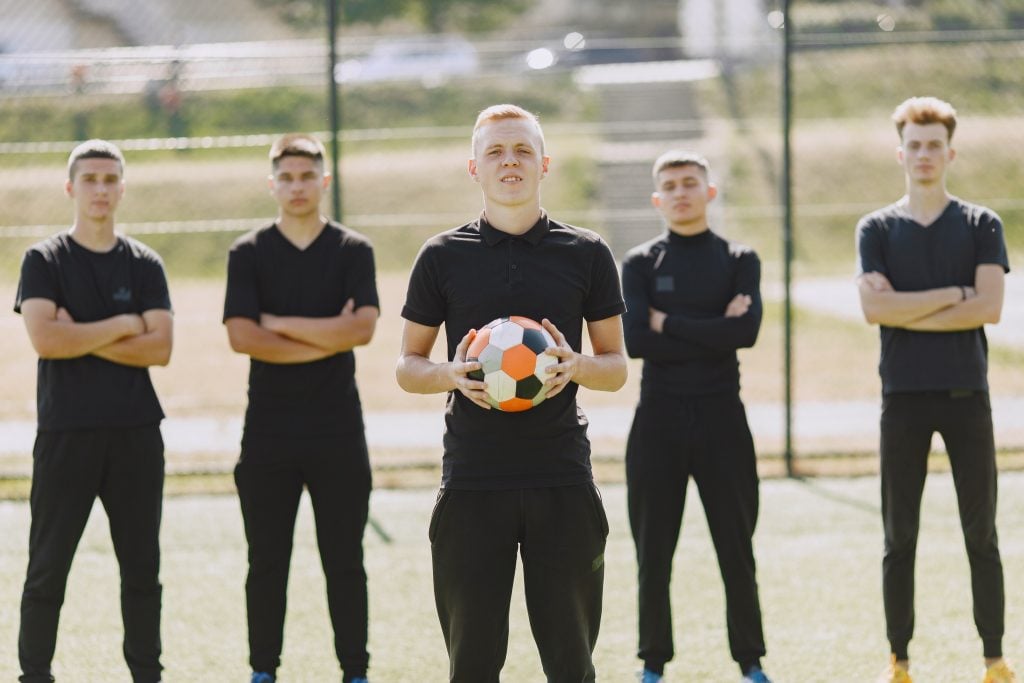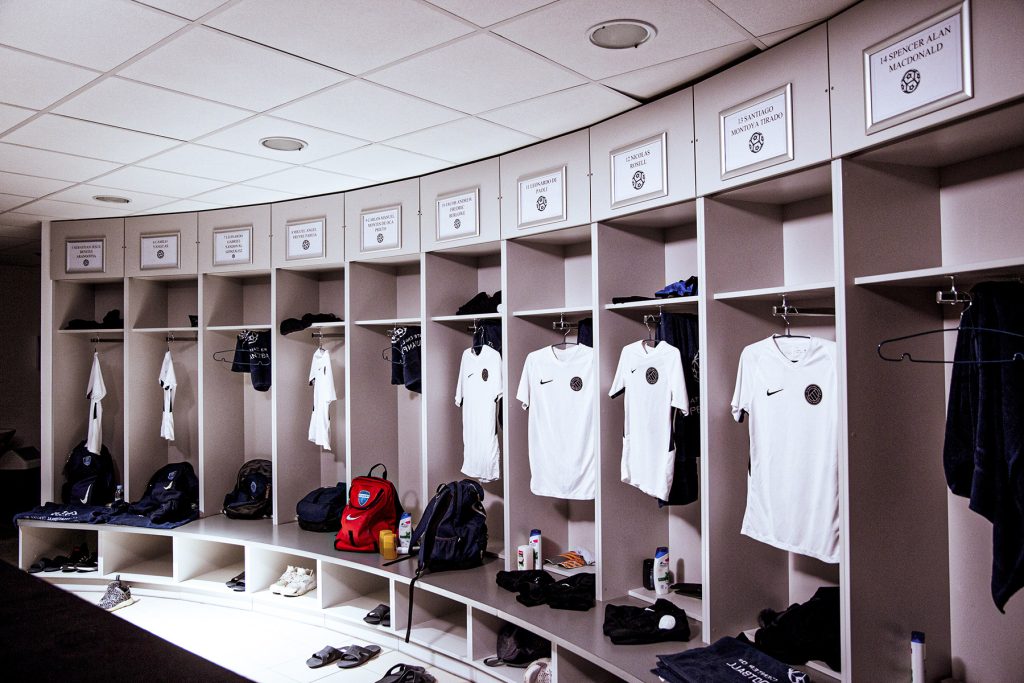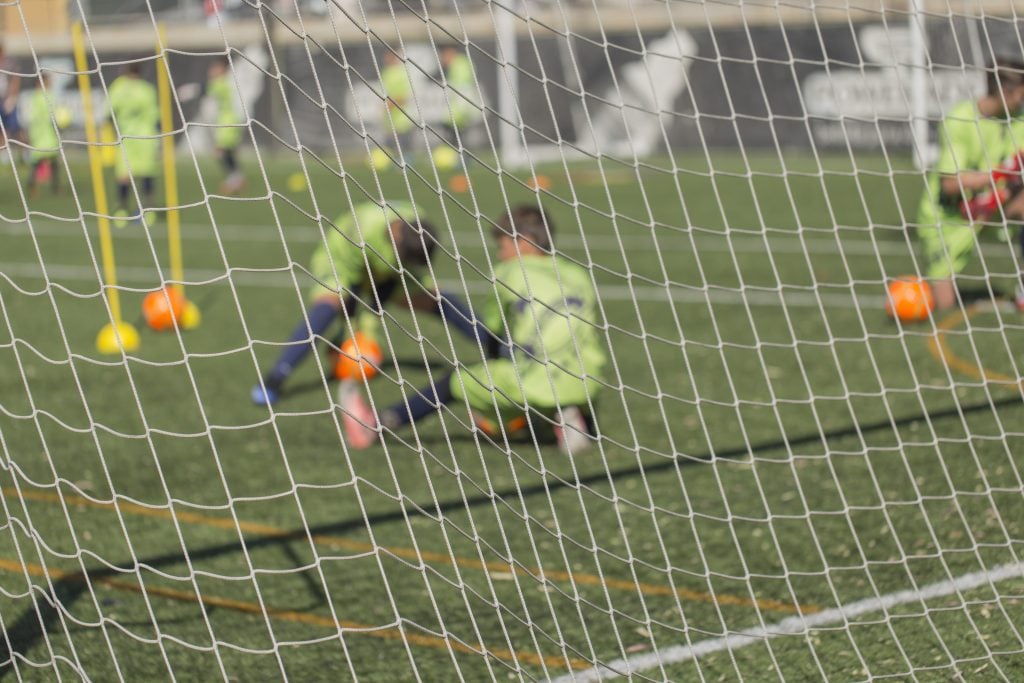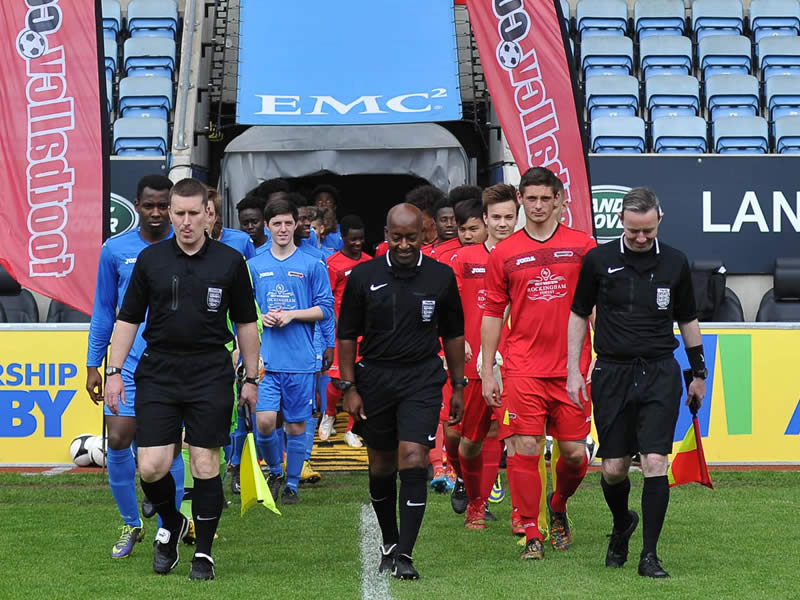Soccer Tryouts 2026
Complete guide to soccer tryouts Do you want to become a professional soccer player?
Soccer is your passion and you have an innate talent for this sport? Surely you are looking for an opportunity for someone to notice you and allow you to make the leap to professional soccer, but do you know how to get to participate in a soccer trial without having contacts? Or better yet, do you know the best way to achieve your goal?
Discover the best trials to access semi-professional soccer teams or to be accepted to be part of the annual team in a High Performance Football Academy that will allow you to reach the necessary level to make the leap to professional football.
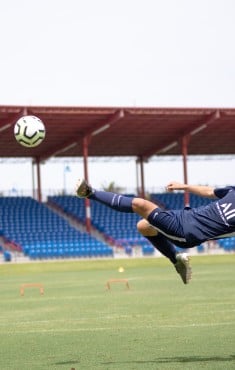
Index
- What Are Football Tryouts?
- Direct tryouts at football clubs
- Tryouts at independent high-performance football academies
- Comparativa de los trials de fútbol
- How to Succeed in a Football Tryout
- What Are Your Real Chances of Making it in Professional Football and What Path Should You Choose to Achieve Your Goal?
How to Choose the Right Tryout for You
Choosing the right pathway will depend on a variety of factors, including your age, skill level, maturity, football experience, and athletic resume.
If you believe you already have what it takes to become a professional footballer, and are at the right age, mature enough, and, most importantly, skilled and experienced enough to excel at a trial, then trying out with a football team might be your best option.
However, if you are not yet old enough or still need to sharpen your skills in order to reach the competition level required in modern European football, the best option would be to try out for a high-performance football academy, which will provide you with the knowledge, level, and networking necessary to succeed in the future.
Below, we will describe each type of football tryout in detail, including their pros and cons and the options available at ERTHEO.
¿What does each Football Tryout Involve and What Are the Pros and Cons?
OPTION 1: Direct tryouts at football clubs
Landing a tryout with a professional football team is the most difficult and demanding option. The only way to get a tryout at one of the best European clubs (such as PSG, Manchester City, or Barcelona) is to receive an invitation. That is to say, one of their scouts has to notice you and invite you to one. But even if you get the invite, being drafted after the tryout can be extremely complicated.
However, you can always go for a lower-level club where you will be training with their top team, an extremely useful experience that could be the stepping stone to landing better offers in the future.
What do Football Tryouts for Semi-Professional Teams Consist of?
When trying out for a semi-professional football team, you must train as a member of the club’s official team. To do so, players are shortlisted after sending an application with videos and a brief history of their football career.
The most interesting aspect of trying out directly with a team is that if you are skilled enough and make the cut, there is a strong possibility you’ll become part of the squad. Once you start playing for an official team, you become much more visible to scouts from bigger teams and professional football agents.
Pros and cons of tryouts in semi-profesional football teams
Advantages
- It is much easier to pass this test than that of a higher level football team.
- It makes you much more visible to football observers and agents.
- It is cheaper than other options.
Disadvantages
- You need to already have a very good level and experience as a footballer.
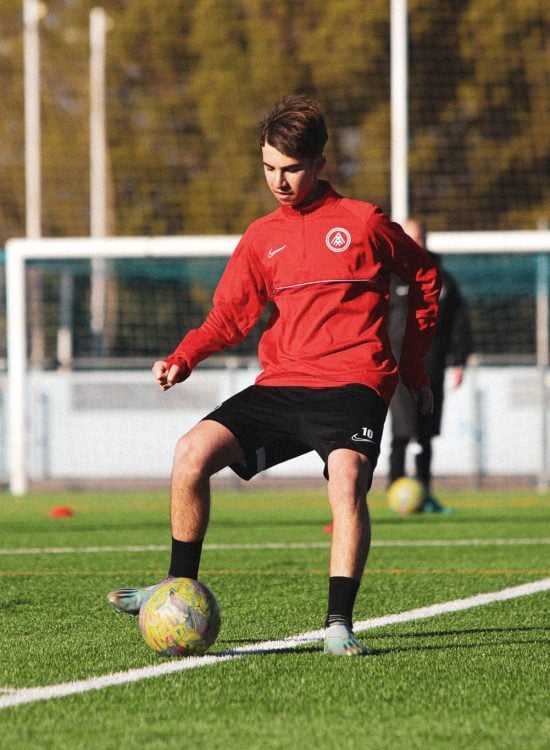
FC Andorra Soccer Trial
1, 2 or 3 week soccer tryouts for 14 to 24 year olds who want to join a semi-professional club to start their soccer career.
Program
Type of program
Age
Required level
Training intensity
Location
Accommodation
Duration
Starting dates
Price
Program
Type of program
Age
Required level
Training intensity
Location
Accommodation
Duration
Starting dates
Price
From 13 to 23
Advance
High
Manresa, Catalonia, Spain
FC Andorra Residence
From 1 week
Clinic available all year round except summer
Football Trials in Spain
These are individual trials in teams all over Spain in categories from 1st RFEF up to 3rd RFEF according to the level of the player. The test consists of being part of the team’s training for a week. The coaching staff evaluates your skills and if they consider that your profile fits what they are…
Program
Type of program
Age
Required level
Training intensity
Location
Accommodation
Duration
Starting dates
Price
Program
Type of program
Age
Required level
Training intensity
Location
Accommodation
Duration
Starting dates
Price
from 16 to 21 years old
Elite
High
Spain
Residence or apartment
from 5 days to 2 weeks
all year round
Need help choosing a program?
Students and parents who contact Ertheo before booking a program are much more satisfied with their overall experience. Talk to one of our consultants to make sure you’re choosing the best program for your objectives and personal preferences.

OPTION 2: Tryouts at independent high-performance football academies
This type of football trial is aimed at players seeking professional training to help them improve their skills and, when the time comes, find trials with teams that match their level.
These trials organized by private academies allow players to get to know the academy before committing to long-term training there and also give the academy a chance to assess if the player is suitable to join their training team. In fact, most talented players also have the opportunity to earn a scholarship and considerably lower the cost of the programme.
We will later get into more detail about how independent high-performance academies work, but in summary: these are training centres run by highly experienced professionals whose job is to train footballers to compete at the highest level.
These academies have established an extensive network of professional clubs across the world and are able to secure football tryouts whenever they feel that the most promising students in their long-term programmes are ready to make the leap to professional football. As these academies are not associated with any club in particular, they can offer tryouts with a wider variety of teams and are able to find the right fit for their players based on their age, skill level, and style of play.
Pros and cons of tryouts at independent high-performance football academies
Advantages
- It is easier to pass the test
- It is an ideal option if you are still very young or lack maturity as a person or as a footballer
- It allows you to continue your academic and football training
- The academy has many contacts to get its top students trials in professional teams
- By not being tied to a specific team, they offer more personalised opportunities, looking for trials in different teams depending on the level, age or style of play of the player
Disadvantages
- It’s a longer road but more likely to succeed
- Requires a higher financial investment than other options (top players may be eligible for scholarships).
- Only students who really reach a competitive level are allowed to enter team trials.
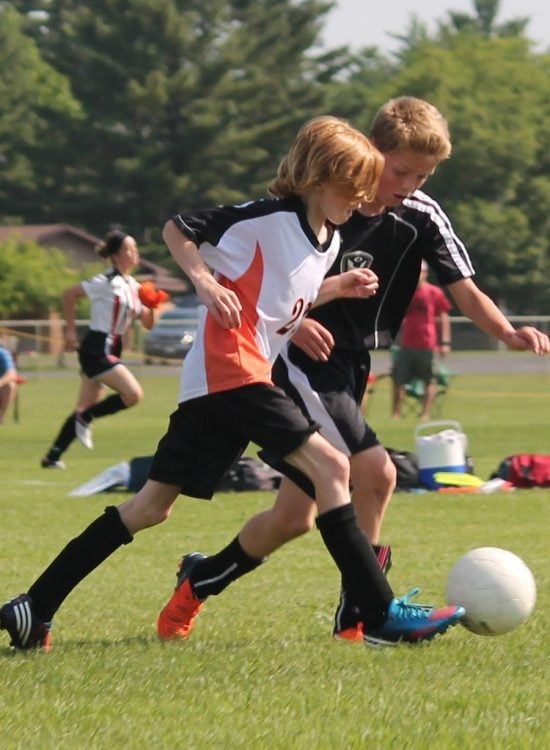
France High Performance Academy football tryout
2 and 5-day programmes for boys between 12 and 18 years of age who want to try out at a high-performance academy and make the leap to professional football.
Program
Type of program
Age
Required level
Training intensity
Location
Accommodation
Duration
Starting dates
Price
Program
Type of program
Age
Required level
Training intensity
Location
Accommodation
Duration
Starting dates
Price
12 to 18 years old
Advanced or elite
High
Evian (France)
Double rooms with Wi Fi connection and air conditioning
3-day pack (2 nights) and 5-day pack (5 nights)
Programme available from 1 September to 30 June
Barcelona High Performance Academy Football Tryout
3, 7, and 14-day programmes for children between 14 and 21 years of age who want to try out at a high-performance academy and make the leap to professional football.
Program
Type of program
Age
Required level
Training intensity
Location
Accommodation
Duration
Starting dates
Price
Program
Type of program
Age
Required level
Training intensity
Location
Accommodation
Duration
Starting dates
Price
14 and 21 years of age
Intermediate or advanced
High
Barcelone
Yes
Pack 3 days Pack 7 days Pack 14 days
All year except summer, Christmas and Easter
High Performance International Football Clinic
This summer, you will have the opportunity to take part in a unique programme. Your future starts here.
Program
Type of program
Age
Required level
Training intensity
Location
Accommodation
Duration
Starting dates
Price
Program
Type of program
Age
Required level
Training intensity
Location
Accommodation
Duration
Starting dates
Price
From 12 to 17 years old
High or elite level
Very High
On the outskirts of London, England
Berkhamsted School (Londres)
2 or 4 weeks of professional training
During the month of July
England High Performance Academy football tryout
7 and 14-day programmes for boys between 16 and 21 years of age who want to try out at a high-performance academy and make the leap to professional football.
Program
Type of program
Age
Required level
Training intensity
Location
Accommodation
Duration
Starting dates
Price
Program
Type of program
Age
Required level
Training intensity
Location
Accommodation
Duration
Starting dates
Price
16 to 21 years old
Intermediate or advanced
High
Leicester
Double rooms with private bathroom
Pack 7 days Pack 14 days
Any period from 29 August 2023 to 16 December 2023 or from 3 January 2024 to 19 May 2024
Need help choosing a program?
Students and parents who contact Ertheo before booking a program are much more satisfied with their overall experience. Talk to one of our consultants to make sure you’re choosing the best program for your objectives and personal preferences.

Compare your options
There are different types of football tryouts, and choosing the right one depends on the skill level, goals, and personal preferences of each player.

STEP ONE: Establish your Goals
Football Team or High-Performance Academy?
Tryouts with a Football Team – The Ideal Candidates
The ideal candidates for this type of programme meet the following requirements:
- They are already in a federation team and play at an elite level.
- They are ready to become professional football players.
Tryouts with a High-Performance Academy – The Ideal Candidates
The ideal candidates for this type of programme meet the following requirements:
- The main goal of attending the academy is to improve their football skills.
- They are already in a federation team and play at an intermediate or advanced level.
- They are looking for intensive training and a competitive environment with high-level players.
- They aim to become professional football players in the future.
STEP TWO: Compare your Options
Once you have decided between a football team or a high-performance camp, you can compare the available options within each category.
Comparison of soccer trials
Program
Program type
Age
Required level
Training Intensity
Accommodation
Location
Duration
Starting dates
Price
Program
Type of program
Age
Required level
Training intensity
Location
Accommodation
Duration
Starting dates
Price
From 12 to 17 years old
High or elite level
Very High
On the outskirts of London, England
Berkhamsted School (Londres)
2 or 4 weeks of professional training
During the month of July
Program
Type of program
Age
Required level
Training intensity
Location
Accommodation
Duration
Starting dates
Price
16 to 21 years old
Intermediate or advanced
High
Leicester
Double rooms with private bathroom
Pack 7 days Pack 14 days
Any period from 29 August 2023 to 16 December 2023 or from 3 January 2024 to 19 May 2024
Program
Type of program
Age
Required level
Training intensity
Location
Accommodation
Duration
Starting dates
Price
14 and 21 years of age
Intermediate or advanced
High
Barcelone
Yes
Pack 3 days Pack 7 days Pack 14 days
All year except summer, Christmas and Easter
Program
Type of program
Age
Required level
Training intensity
Location
Accommodation
Duration
Starting dates
Price
12 to 18 years old
Advanced or elite
High
Evian (France)
Double rooms with Wi Fi connection and air conditioning
3-day pack (2 nights) and 5-day pack (5 nights)
Programme available from 1 September to 30 June
Program
Type of program
Age
Required level
Training intensity
Location
Accommodation
Duration
Starting dates
Price
from 16 to 21 years old
Elite
High
Spain
Residence or apartment
from 5 days to 2 weeks
all year round
Program
Type of program
Age
Required level
Training intensity
Location
Accommodation
Duration
Starting dates
Price
From 13 to 23
Advance
High
Manresa, Catalonia, Spain
FC Andorra Residence
From 1 week
Clinic available all year round except summer
How to Succeed in a Football Tryout
Would you like to learn how you can increase your chances of success at a football tryout?
To succeed in a football tryout is no easy feat, but it can be a crucial step towards becoming a professional football player. Success does not simply rely on choosing the right tryout at the right time, it involves thorough training and preparation. There is a lot at stake, fierce competition, and very little time to demonstrate your talent.
In this section, we will share with you the skills and values professional football scouts, coaches, and agents look for in a player so you can prepare accordingly and make sure you get noticed.
What Scouts Look For at Tryouts and How to Stand Out
Here you will learn what football professionals value most when scouting players during tryouts, as well as how to improve on each of these aspects, not only to stand out at a tryout, but to gain valuable tools that will help you throughout your football career.
Take note!
Technical Training
Naturally, you will have to practice all the basic technical aspects, such as:
- Passing
- Dribbling
- Striking
- Ball control
You will also be judged based on your tempo and how you move across the field, so make sure to work on these aspects as well. Always focus on your strengths, which will help you stand out, but remember to work on your weaker points too, as they may affect your overall assessment.
Ask your coach for advice on how to improve on these technical aspects, and do not stop practising until the day of the tryout!.

Tactical Training
When it comes to tactics, scouts will focus on aspects such as football instincts, game strategy implementation, and decision making. Essentially, they will assess your game awareness and insight, not just what you do when you have the ball, but also how you perform when you don’t.
To improve your tactical skills, you must understand your role on the field. This way you will improve both your own and your team’s gameplay. A very helpful tip is to study other players in the same position as yours, watch and analyse matches, and even read books about football tactics. Always remember that knowledge is power, so the more you learn about football the more you can improve your strategic side.

Mental Training
Making it in professional football does not happen overnight. Building a successful career is a marathon, not a sprint, and requires sacrifice, discipline, and perseverance. These three concepts are inextricably linked to mental strength.
Working on your mental strength before a tryout will help you control your nerves, focus on giving your best, and prevent external factors and insecurities from hindering your performance at such a crucial moment.
This Meditation and Mindfulness Guide for Young Athletes will be of real help. You can also find online sport psychology sessions to gain some valuable insight for your upcoming matches.
Even if you fail, working on your mental strength will allow you to develop powerful tools that will help you get back on your feet and keep working until you achieve everything you set your mind to, so make sure to never stop nurturing it!
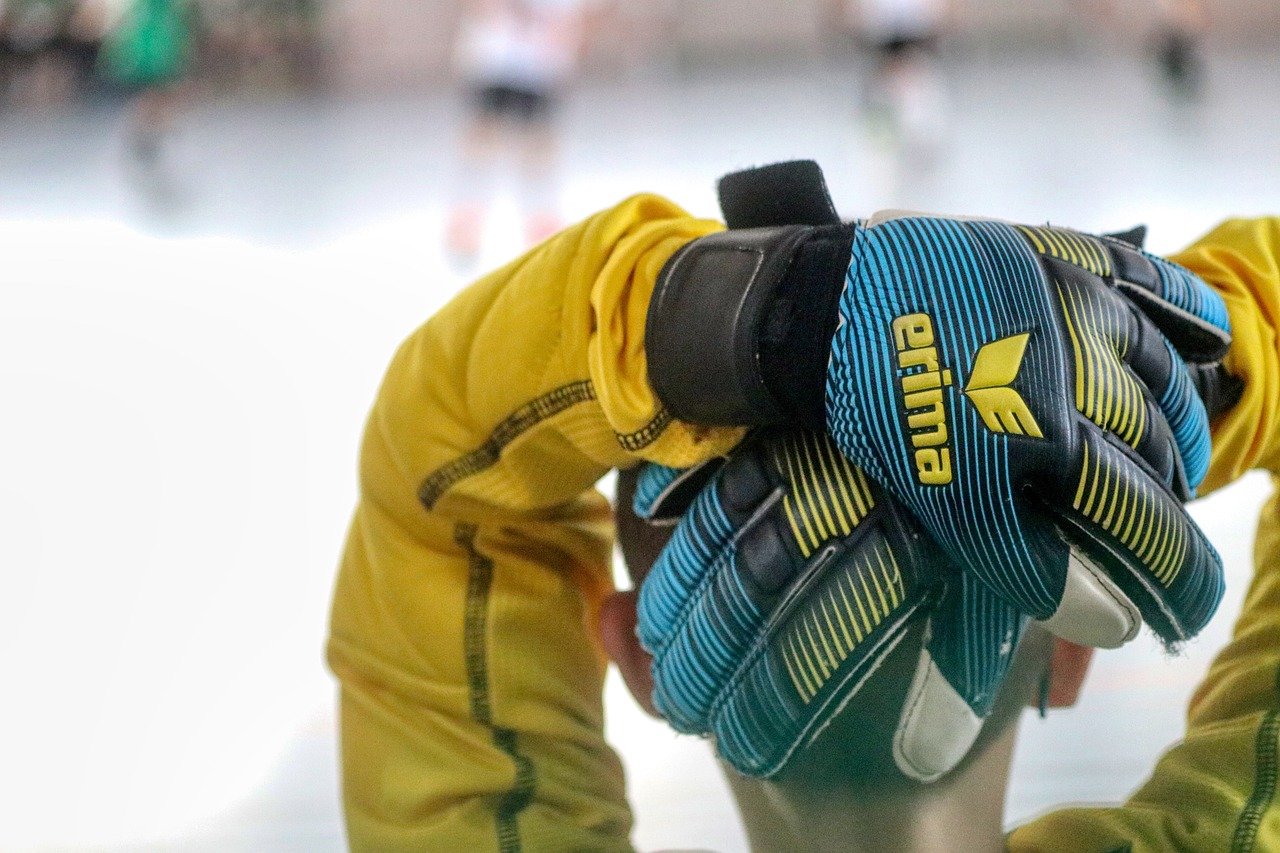
Physical Conditioning
Physical conditioning is another key aspect of success in a football tryout. Running out of stamina after the first fifteen minutes will not do you any favours when trying to stand out and showcase your abilities at a tryout. You must build endurance and learn how to manage your stamina in order to deliver a high-level performance throughout the duration of any tryout or competition where scouts may be watching.
Recruiters will be focusing on your agility and speed, and will value aspects such as ease of movement, power, and explosiveness. Physical conditioning can also help you prevent injuries or speed up the recovery process in case of one, which is also a factor football professionals value highly.
Together with a fitness trainer, you can work on building muscle mass at the gym and doing specific exercises to improve both your speed and endurance.
Adequate nutrition and rest are also essential, as these are the cornerstones of good health and can adversely influence your athletic performance if not properly taken care of.
Make sure to maintain a healthy and balanced diet, adjust your calorie and macronutrient intake to your energy needs, and get into a good sleep routine, which will help you have more energy, improve your decision-making skills, and boost muscle recovery after competitions and training sessions.
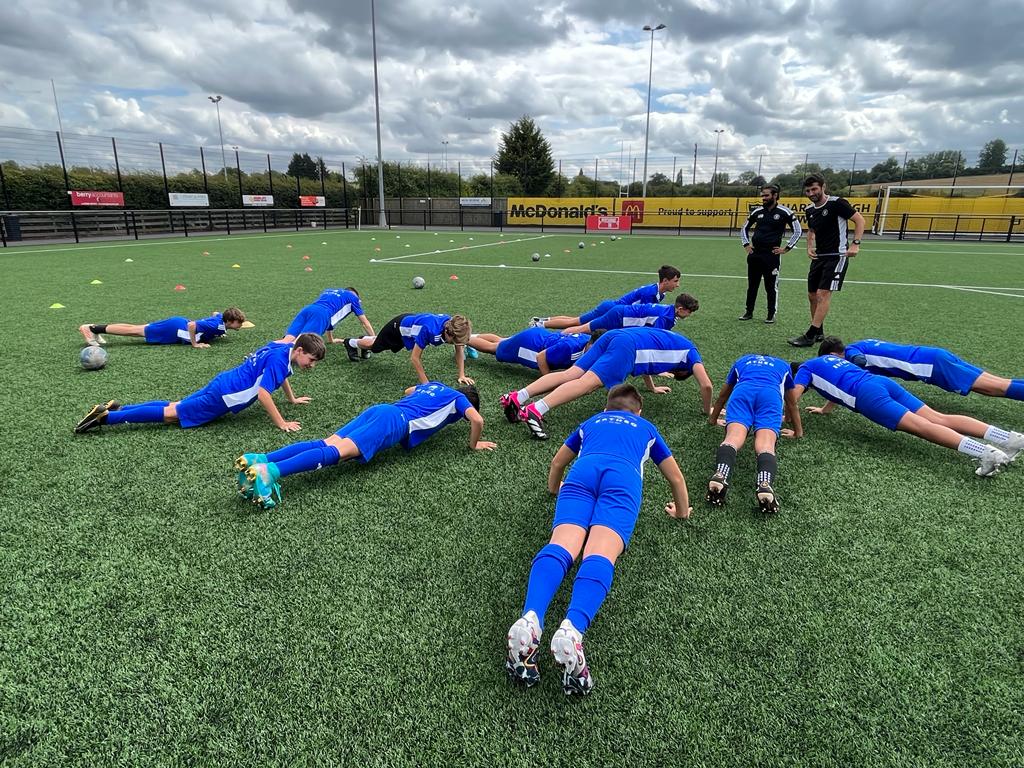
Behaviour and Personality
Another aspect assessed in a football tryout is your attitude. Do you think a recruiter would choose a player that is complaining or brooding all the time?
Poor behaviour or negative body language during a tryout can easily sabotage everything you have worked for. Be respectful, avoid arguments, encourage your team, and bring your winning personality out for everyone to see. Showcase that unique talent you have worked so hard to cultivate, and for which you believe you deserve a spot in the highly competitive world of professional football.
Put yourself in the shoes of the recruiters and think: What would I look for in a player?
Then strive to be that person, bring out your absolute best, and show them what they want to see. Eventually, your opportunity will come.
What Are Your Real Chances of Making it in Professional Football and What Path Should You Choose to Achieve Your Goal?
In all honesty, the chances of making it in the world of professional football are very low, which is why it is crucial to choose the right path for success.
In the United States, most professional football players go through the National Collegiate Athletic Association (NCAA) and play in American universities before turning pro. Only 1.4% of NCAA footballers go on to play professionally.
In Europe, many players manage to get into clubs’ academies from an early age with the hope of moving up the rankings and eventually joining the first team. Less than 1% of all children who enter a European football academy at the age of 9 achieve their dream of becoming professional footballers.
As you will see, it takes more than just talent and motivation to become a professional football player, so you have to learn the best way to make your dream come true.
What are the best ways to become a professional footballer?
Below, we will share with you all the possible paths you can take in the pursuit of your dream.
The Shorter Path (Albeit Riskier)
The most direct ways to make it to a professional football club’s junior team are:
Through Professional Agents
A football agent is a professional representative with contacts within the industry that you hire to find you an opportunity in the world of professional football. It is usually semi-professional players who decide to hire agents, and give them a percentage of their salaries in exchange for their services.
While there are certainly excellent professional agents out there, unfortunately it is a role with a poor reputation due to the great number of cases where they fail to fulfil their duties, ask for money up front, or negotiate exclusivity agreements that end up being a problem rather than boosting their clients’ careers.
If you decide to hire an agent to guide you through your football career, always try to look for FIFA registered agents and make sure to never pay money up front.
Through Scouts/Recruiters
If you are already playing for one of the best teams in your area, winning most matches, and regularly making it to finals, then it is highly likely that a scout has already seen you play.
If you are skilled enough and have the right attitude, it is probably only a matter of time before someone notices you and offers you a football tryout. In the previous sections, you will find detailed advice on how to succeed at a football tryout.
Although a valid way to go, the truth is that very few players manage to get drafted through this method. If you are not yet mature enough or still have some work to do in order to reach the required level, then a football academy might be a better path as you will be able to further develop your football skills and fulfil your true potential to open up future opportunities.
Through Football Tryouts
Most football tryouts held by official clubs require an invitation. However, there are also a considerable number of tryouts organised by private companies, who ensure the presence of scouts and industry professionals and promise great chances of success.
Players usually attend these tryouts with high expectations, but unfortunately the promises are not always met.
Be wary of companies who promise golden opportunities, as landing a signing by means of these tryouts is extremely rare, and young players can lose hope when investing in a programme that does not deliver the expected results.
At Ertheo, we exclusively offer reliable tryouts at academies and teams that we know first hand, and provide honest and personalised advice on your chances of success to help you choose the option that fits you best based on both your skill level and personal goals.
Through Well-Connected Coaches
The best option for making it directly into professional football is if your trusted coach, who knows you well and is aware of your potential, has useful contacts within the football industry and can get you an opportunity. Your coach will know better than anyone when it’s the right time for you to take the leap, and will guide and advise you best on your road to becoming a professional footballer.
The Longer (and Safer) Path to Going Pro
We have already addressed the faster and better-known ways of getting into a football tryout for an opportunity to be drafted by a professional club.
What most people fail to mention is what happens afterwards. Just how many of these young players manage to have a long-term football career after being drafted?
As previously mentioned, less than 1% of all children who enter a European football academy at the age of 9 end up fulfilling their dream. In fact, 5 out of 6 professional players signed at the age of 16 are discharged before they turn 21. Most players end up heartbroken and without the proper education to allow them to pursue a professional career outside of football.
This discouraging data is the combined result of multiple factors:
- Players are drafted at a very young age, without being mature enough to bear the many responsibilities, be away from their families, etc.
- Players are up against fierce competition, which can be demoralising. One season you are the absolute best, and the next you are overshadowed by three new players who are better than you.
- Lack of personal attention. The focus is on what is best for the team, not your personal development.
- Poor commitment to education. Although the subject of continuing athletes’ education while competing at a professional level has been gaining traction over the years, there are still many players who disregard their academic education and focus solely on their sports career.
These are the reasons why we strongly recommend going to a High-Performance Football Academy before making the leap to professional football.
What Are the Advantages of Joining a High-Performance Football Academy?
– A good academy provides everything you need to reach the competition level required in modern European football and the maturity necessary to increase your chances of building a successful career in professional football.
– Furthermore, it has a strong network of contacts to land you a tryout when they deem you are ready, and know which teams you would fit best and have a better chance of success with.
– These academies are dedicated to providing personalised training and care, and your education and development is their number one priority.
– They also offer a great selection of educational options so that you can continue your education and invest in your future, whether you make it in professional football or not.
Even though training at a high-performance academy for one or more years does not guarantee that you will become a professional football player (as not all students make it), it most definitely increases your chances of success.
Their training programmes will teach you all the necessary knowledge and values you need to be fully ready to take part in a tryout when the time comes, and are skilled and mature enough to successfully face what comes next once you get drafted.
Players like Oliver Torres, Diego Kochen, and Berta Pujadas have chosen this path and they seem to be doing pretty well, don’t you think?
Are There Any Downsides?
Of course! All options have pros and cons. We will discuss them below, so you know exactly what to expect:
– As we mentioned before, this option requires more time. It usually takes several training seasons in order to gain the knowledge, attitude, and skill level necessary to secure (and succeed) in a tryout.
– It requires a greater economic investment, although the most talented players can apply for a scholarship to help finance part of the academy programme.
– Just like with every other option, not all academy students will become professional footballers, but it is an excellent opportunity to figure out if you truly have a future in football, or if maybe it’s best to start looking for a plan B, whether football related or not.
You now have all the information you need to choose the option that suits you best and make the leap to professional football. Never forget that the players who achieve their dreams are the ones that never give up. Don’t ever stop pursuing your dreams and remember that the most important thing is to enjoy the journey. Best of luck!
Now you know the options you have to make the leap to professional soccer and you can choose the one that best suits your personal goals.
Don’t forget that the players who achieve their dream are the ones who never give up.
If you have a dream, don’t stop fighting until you achieve it, but remember that the important thing is to enjoy the journey.
Good luck to you!
Do you have any questions?

